Risk
The CALP Network’s State of the World’s Cash report found that the perception that CVA is riskier than other forms of aid was one of the main barriers to CVA being routinely used. This concern is linked to the growing emphasis from donors on anti-terrorism and money laundering, and shrinking budgets for humanitarian assistance. The CALP Network’s work under this theme aims to debunk myths, facilitate collaboration, and share learning to ensure that CVA is systematically and equally considered, based on evidence of actual risks across modalities.
Current priorities
A variety of organisations are currently working on CVA and risk. The CALP Network is working to identify synergies among actors, avoid duplication, and define joint priorities that can be better addressed collectively. Together with WFP, the CALP Network is co-leading the risk priority within the Grand Bargain workstream on cash.
Featured content

Podcast: Will risk aversion hold us back from realizing the potential of CVA?
Podcast
Episode 1 of the CashCast, exploring how attitudes to risk have impacted the use of CVA in the Middle East and North Africa region.

CVA and Risks: What happens in the field, stays in the field?
Blog Post
In October 2019 in Douala, Cameroon, the CALP Network facilitated a learning event exploring the risks to beneficiary protection in Cash and Voucher Assistance (CVA). This closed-door workshop, held as part of series of meetings and webinars on theme of CVA and risk in different regions, convened 25 humanitarian workers from West and Central Africa representing local and international NGOs, UN...

Webinar: Data sharing in CVA: ethics, ownership and privacy
Event
Thematic lead
Latest
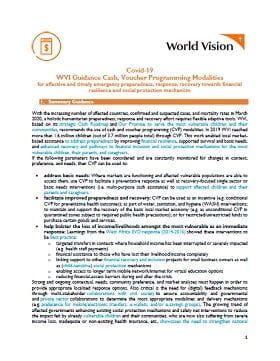
Covid-19 WVI Cash, Voucher Programming Modalities
Guidelines and Tools
With the increasing number of affected countries, confirmed and suspected cases, and mortality rates in March 2020, a holistic humanitarian preparedness, response and recovery effort requires flexible adaptive tools. WVI, based on its strategic Cash Roadmap and Our Promise to serve the most vulnerable...
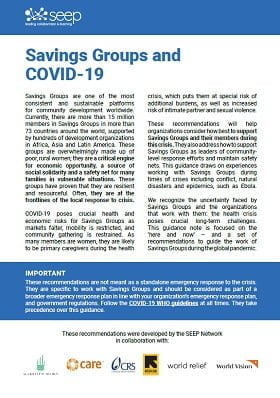
Savings Groups and COVID-19
Guidelines and Tools
COVID-19 poses crucial health and economic risks for Savings Groups as
markets falter, mobility is restricted, and community gathering is restrained. As many members are women, they are likely
to be primary caregivers during the health crisis, which puts them at special risk of additional burdens, as well...
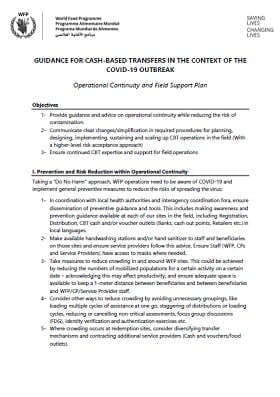
WFP – Guidance for Cash-based Transfers in the Context of the Covid-19 Outbreak
Guidelines and Tools
The objectives of this document are:
1- Provide guidance and advice on operational continuity while reducing the risk of contamination.
2- Communicate clear changes/simplification in required procedures for planning, designing, implementing, sustaining and scaling up CBT operations in the field (With a...

Cash Week 2019: How cash is driving change across the system
Blog Post
Cash Week 2019 aimed to provide a space to reflect, learn, and look ahead, to ensure quality in our use of CVA at scale. The CALP team reflects on the key takeaways from the events that took place around the world, and what they mean for actors within and beyond the humanitarian sector.

Mitigating Risks of Abuse of Power in Cash Assistance in Uganda
Report
This document outlines lessons learned from a joint UNHCR/WFP project in Uganda with the aim to identify and mitigate the risks of abuse of power in cash assistance through the main delivery mechanisms used in-country: mobile money, e-cards and cash delivered through mobile vans.

A guide to Cash and Voucher Assistance at Humanitarian Networks and Partnership Week
Blog Post
Don’t miss any of the sessions on cash and voucher assistance during the Humanitarian Networks and Partnership Week, which takes place in Geneva from 3 to 7 February 2020. On Monday 3 February, dive into the week with a session from the CALP Network on the Future of Financial Assistance: Supporting...
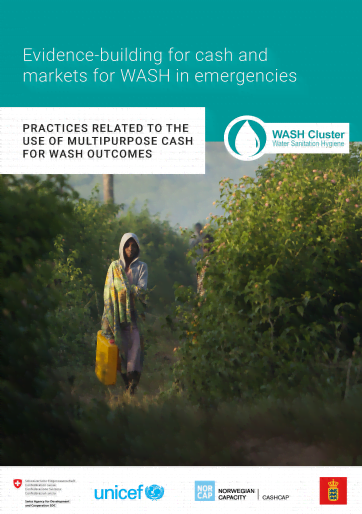
Evidence-building for Cash and Markets for WASH in Emergencies: Practices related to the use of multipurpose cash for WASH outcomes
Report
This report aims specifically to: present current practices (and practice gaps) of the use of MPC for WASH outcomes in emergencies, identifying the contexts and conditions under which MPC is used and highlighting lessons learned in contexts where humanitarian actors use MPC as a tool to meet basic needs,...
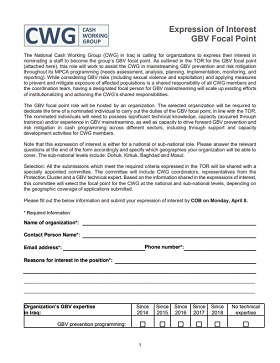
Expression of Interest GBV Focal Point
Policy paper
The National Cash Working Group (CWG) in Iraq is calling for organizations to express their interest in nominating a staff to become the group’s GBV focal point. As outlined in the TOR for the GBV focal point (attached here), this role will work to assist the CWG in mainstreaming GBV prevention and risk...

Podcast: Will risk aversion hold us back from realizing the potential of CVA?
Podcast
Episode 1 of the CashCast, exploring how attitudes to risk have impacted the use of CVA in the Middle East and North Africa region.

Cash and Voucher Assistance and Risk in Financial Management and Compliance
Report
The CALP Network commissioned a scoping study on CVA and risk in financial management and compliance, which considered three specific challenges facing humanitarian organisations related to AML/ CTF regulations:
1. Transferring funds to the country of operations – challenges in identifying competent and...

Cash Week 2019: Collaborating for quality, today and tomorrow
Event
Cash Week 2019 provided a space to reflect, learn, and look ahead, to ensure quality in our use of cash and voucher assistance (CVA) at scale. An expanded agenda saw events taking place globally throughout November and December.

Risks learning event recommendations – Dakar
Report
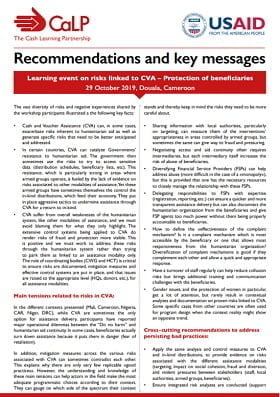
Risks learning event recommendations – Douala
Report

CVA and Risks in West and Central Africa: Putting beneficiary protection and responsible data management at the heart of our work
Event

CVA and Risks: What happens in the field, stays in the field?
Blog Post
In October 2019 in Douala, Cameroon, the CALP Network facilitated a learning event exploring the risks to beneficiary protection in Cash and Voucher Assistance (CVA). This closed-door workshop, held as part of series of meetings and webinars on theme of CVA and risk in different regions, convened 25...

The Future of Financial Assistance: Why we wrote it, and where next
Blog Post
The world is changing rapidly. The way we deliver assistance is not. The CALP Network and IARAN’s new report on the Future of Financial Assistance makes clear that (i) significant change is urgently needed – new partners, new tools, new modes of collaboration, (ii) change must be drive by what’s...

Harmonising Data Systems for Cash Transfer Programming: Three key steps for Somalia
Blog Post
Cash and voucher assistance (CVA) is gaining traction as a transformative tool for addressing humanitarian needs in Somalia, with people living in crisis reporting that transfers of this kind helped to build resilience and diversify livelihoods. Delivery, however, is plagued by data challenges around the...
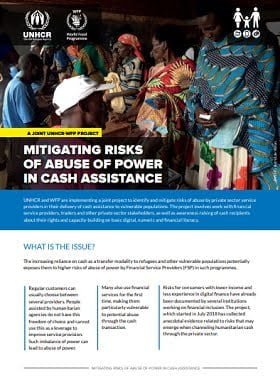
Mitigating Risks of Abuse of Power in Cash Assistance – 4 pages
Report
UNHCR and WFP are implementing a joint project to identify and mitigate risks of abuse by private sector service providers in their delivery of cash assistance to vulnerable populations. The project involves work with financial service providers, traders and other private sector stakeholders, as well as...

Towards Organizational Readiness for Data Responsibility: A simple framework for responsible data champions
Blog Post
This blog is the third in a series on cash and voucher assistance (CVA) and risk. While the first blog busted some myths around misappropriation and fraud in CVA, the second blog looked into a specific risk for recipients of CVA: the risk of misuse of personal data. This third, guest blog from Linda...

How Will Financial Assistance Look in 2030? Here are your thoughts so far
Blog Post
In 2030, humanitarian crises and the ways in which humanitarian needs are met will look very different from today. The role of financial assistance is growing: it is estimated that $4.8 billion was delivered in cash and voucher assistance (CVA) in 2018, as well as $686 billion in remittances, while 2.5...



